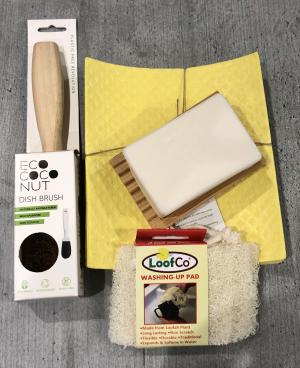Is Reducing Plastic The Answer?
When I talk about living a more eco-lifestyle, my aim is to encourage you to reduce or
stop using as much single use plastic as you possibly can. In particular, I mean items such
as plastic carrier bags, water bottles, plastic lined coffee cups, plastic razors,
shampoo bottles, cotton buds and much more. The idea behind promoting using less
plastic is in order to help you to understand how to swap out products that you use
regularly for great eco-friendly alternatives instead. Items such as reusable make-up
pads, shaving bars, shampoo bars and much more.
What are single use plastics?
Single use plastic is a plastic item that is designed for a one time use. For example a
plastic wrap on a magazine or a plastic lid on a coffee or tea cup that will be disposed of
in landfill once used. Other examples include the plastic gloves that you use at the petrol
station when you’re filling up, toothpaste tubes that you’ll throw away, cleaning products
such as sprays that you’ll use and then dispose of once emptied.
What are reusable plastics?
Reusable plastic items can be used again and again. For example, a Tupperware
container that is made of plastic but that is used over and over again. I see many of
these reused in our refill shop which is great to see.
Many of us have items in and around our home that are examples of reusable plastics
such as phone cases, water bottles, lunch boxes to name just a few.
Why should you reduce your plastic usage?
When we throw plastic away it, doesn’t biodegrade. Instead it degrades, which means it
breaks down into tiny pieces which ultimately gets into our food chain. We’ve all seen
stories internationally about how big a problem plastic is in our oceans and more. Recent
studies have shown a large increase in micro plastics found in in the fish that ultimately
ends up on our plates. To make plastic, we use energy which in-turn burns more fossil
fuel and the outcome is the affects that we see daily on how climate change is speeding
up and affecting our day to day lives.
Is it possible to live without plastic?
I’ll be honest with you – going entirely plastic free isn't easy. Plastic invades our every
day lives in countless ways. Although it would be technically possible to live without it,
most of us would find that a step too far.
- A large proportion of fabrics and soft furnishings contain synthetic fibres. Your sofa, carpet, clothes, shoes, cushions, curtains, towels and much more contain plastic.
- Most of our appliances and devices contain plastic. Fancy living without your fridge freezer, washing machine, dishwasher, mobile phone, tablet or computer?
- Planes, buses, trains, bicycles, running gear and trainers all contain plastic. How would we get around if we couldn't use plastic for these items?
When plastic can be a benefit?
- Single use plastic can protect us from harm at times. In hospitals it can help restrict the spread of infection and disease. Some people need to use disposable straws because of an illness or disability.
- Food waste gives off methane in landfill. Methane is a greenhouse gas, far more potent than CO2. Some plastic food packaging is often specially designed to prolong the life of our food and reduce food waste.
- The carbon cost of using plastic packaging is lower than most alternative materials at the moment. This is true for plastic bags too. They have a lower carbon cost than paper bags and a much lower carbon cost than a cotton tote bag (cotton is also very pesticide and water intensive to grow). So unless we are careful we may be switching the plastic problem for other environmental problems.
How to reduce the plastics you use day to day.
Start with the basics –
- Stop using throw away plastic products in your life such as straws, coffee cups, water bottles and plastic bags.
- Think beyond just replacing plastic with any old plastic free alternative when you are making swaps. Do you really need the product at all? Would it be better to make use of what you already have before you get a replacement? Are the alternatives on offer actually going to be better for the environment?
- Don’t avoid plastic altogether, only do it when it makes sense to do so. We aren’t living in a world with perfect alternatives for every situation right now, so go easy on yourself.
What we need to focus on, is not necessarily on never using plastic, instead its on reducing the amount that we use and where possible using the right types of alternatives instead.

